TheLostSwede
News Editor
- Joined
- Nov 11, 2004
- Messages
- 18,854 (2.50/day)
- Location
- Sweden
| System Name | Overlord Mk MLI |
|---|---|
| Processor | AMD Ryzen 7 7800X3D |
| Motherboard | Gigabyte X670E Aorus Master |
| Cooling | Noctua NH-D15 SE with offsets |
| Memory | 32GB Team T-Create Expert DDR5 6000 MHz @ CL30-34-34-68 |
| Video Card(s) | Gainward GeForce RTX 4080 Phantom GS |
| Storage | 1TB Solidigm P44 Pro, 2 TB Corsair MP600 Pro, 2TB Kingston KC3000 |
| Display(s) | Acer XV272K LVbmiipruzx 4K@160Hz |
| Case | Fractal Design Torrent Compact |
| Audio Device(s) | Corsair Virtuoso SE |
| Power Supply | be quiet! Pure Power 12 M 850 W |
| Mouse | Logitech G502 Lightspeed |
| Keyboard | Corsair K70 Max |
| Software | Windows 10 Pro |
| Benchmark Scores | https://valid.x86.fr/yfsd9w |
GlobalFoundries (GF) today sued IBM for trade secret misappropriation. The complaint asserts the former semiconductor manufacturing company has unlawfully disclosed GF's confidential IP and trade secrets, after IBM sold its microelectronics business to GF in 2015. The technology at issue was collaboratively developed, over decades, by the companies in Albany, New York and the sole and exclusive right to license and disclose that technology was transferred to GF upon the sale.
In the legal action filed in federal court in the Southern District of New York, GF asserts that IBM unlawfully disclosed GF IP and trade secrets to IBM partners including Intel and Japan's Rapidus, a newly formed advanced logic foundry, and by doing so, IBM is unjustly receiving potentially hundreds of millions of dollars in licensing income and other benefits.

The complaint notes that IBM's executives have described the Intel and Rapidus partnerships as based on decades of technology derived from research conducted at the Albany NanoTech Complex, technology that they had no right to disclose. It also raises concerns over the extent to which IBM may have unlawfully disclosed GF's IP and trade secrets beyond these two heavily publicized partnerships.
GF is asking for compensatory and punitive damages as well as an injunction against IBM preventing further unlawful disclosure and use of GF's trade secrets.
In addition, GF's complaint asserts that IBM is targeting and recruiting GF's world-class engineering talent at the company's manufacturing facility, which is located near the Albany NanoTech Complex. In the complaint, GF asks the court to end the unlawful recruitment efforts, which have accelerated since the IBM/Rapidus announcement in December 2022.
GF has made significant investment in research and development to advance its feature-rich technology and is one of the world's leading semiconductor foundries with a global footprint and more than 13,000 employees, 2,500 of whom are based at the company's headquarters in upstate New York. GF will aggressively defend its investments in technology against those who violate them, as the complaint demonstrates IBM has repeatedly done.
View at TechPowerUp Main Site | Source
In the legal action filed in federal court in the Southern District of New York, GF asserts that IBM unlawfully disclosed GF IP and trade secrets to IBM partners including Intel and Japan's Rapidus, a newly formed advanced logic foundry, and by doing so, IBM is unjustly receiving potentially hundreds of millions of dollars in licensing income and other benefits.

The complaint notes that IBM's executives have described the Intel and Rapidus partnerships as based on decades of technology derived from research conducted at the Albany NanoTech Complex, technology that they had no right to disclose. It also raises concerns over the extent to which IBM may have unlawfully disclosed GF's IP and trade secrets beyond these two heavily publicized partnerships.
GF is asking for compensatory and punitive damages as well as an injunction against IBM preventing further unlawful disclosure and use of GF's trade secrets.
In addition, GF's complaint asserts that IBM is targeting and recruiting GF's world-class engineering talent at the company's manufacturing facility, which is located near the Albany NanoTech Complex. In the complaint, GF asks the court to end the unlawful recruitment efforts, which have accelerated since the IBM/Rapidus announcement in December 2022.
GF has made significant investment in research and development to advance its feature-rich technology and is one of the world's leading semiconductor foundries with a global footprint and more than 13,000 employees, 2,500 of whom are based at the company's headquarters in upstate New York. GF will aggressively defend its investments in technology against those who violate them, as the complaint demonstrates IBM has repeatedly done.
View at TechPowerUp Main Site | Source






